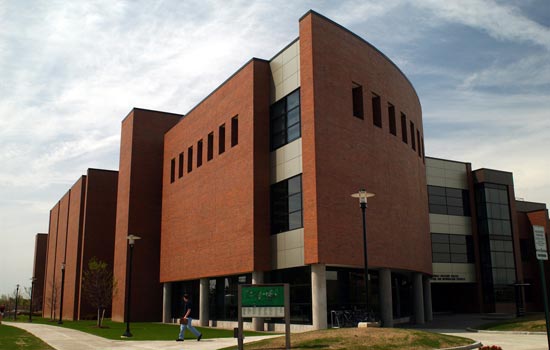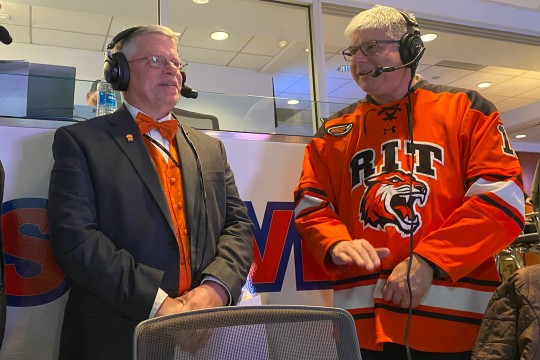Free and open source software culture grows
Academic minor allows graduates to bring FOSS mindset into workforce
A. Sue Weisler
The first graduates of RIT’s minor in FOSS and free culture are already making an impact in the FOSS community and at companies, including Microsoft and Amazon. RIT began offering the nation’s first minor in free and open source software (FOSS) and free culture in 2014.
In just the first year offering the free and open source software and free culture minor, Rochester Institute of Technology has graduated five students who are already sharing their insights with the workforce.
By 2016, the number of FOSS minor graduates is expected to double.
RIT’s School of Interactive Games and Media launched the nation's first minor in free and open source software (FOSS) and free culture in 2014, after offering classes in FOSS since 2009. The interdisciplinary program is aimed at students from across the university who want to develop a deep understanding of how they can use the technological and social sides of FOSS and free culture to spur innovation.
RIT’s minor comes at a time when more companies are opening up their intellectual property, code and development processes. In just the last year, Tesla and Ford announced that they are opening their electric car patents, while Apple and Microsoft are opening parts of their technology platform and tools.
“After graduating I went to work at Microsoft as a Web developer and along with championing the use of open source tools and libraries internally, I have been working to find parts of our codebase that can be opened up,” said Daniel Jost ’15 (game design and development, FOSS minor). “I’ve been very happy with the push across Microsoft to open source a number of different projects and I am working to continue that trend.”
The 15-credit-hour minor, open to undergraduates across the university, is not exclusively for technical students. The three core courses, from the B. Thomas Golisano College of Computing and Information Sciences and the College of Liberal Arts, examine the history and thinking behind open development and copyright alternatives and the processes in which creative and technical work are shared and co-created.
“My favorite thing about the minor is that I didn’t have to take a single class that required additional engineering,” said Colden Cullen ’15 (game design and development, FOSS minor), who works as a software development engineer at Amazon. “The entire focus was on working well with people, the history of the FOSS community and how to be taken seriously.”
Student projects, both in and outside of classes, have included game engines, citizen journalism platforms, video games and websites.
This summer, Alexandria Mack ’15 (game design and development, FOSS minor) is member of a team that has been creating a World of Warcraft add-on, written in the open source language Lua, that gives your character a simulated form of Type II diabetes.
“I hope the project helps people who have just been diagnosed with diabetes, or people with friends who have diabetes, to learn more about the disease and what living with it might be like,” said Mack. “Game design is normally closed source, but with FOSS everyone is able to share code and design and learn from each other.”
The program focuses on how developers, inventors, entrepreneurs and artists can advance innovation and creativity. It also teaches students how to share what they do, while making a living or a profit.
“We are—as artistic and technical cultures—starting to rethink the way we work together and share the results of that work,” said Stephen Jacobs, professor of interactive games and media and associate director of RIT’s Center for Media, Arts, Games, Interaction and Creativity (MAGIC). “We hear more and more from recruiters that they look for shared repositories of technical work, or ‘open’ portfolios as part of their hiring process.”
Red Hat Inc., a leading provider of open source software solutions, has been a ongoing collaborator in FOSS programs at RIT. Red Hat has supported Jacobs’ FOSS@MAGIC initiative, which promotes the practice of free and open source software development by connecting students to humanitarian projects, independent studies, co-op opportunities, conference registrations and travel, summer undergraduate research fellowships, faculty and staff professional development opportunities and hackathons.
“I knew that the minor would grow my knowledge and passion for open source and the community involved with it,” said Jost. “Now it’s a bit like a tattoo, where I can point to the minor as something that I am proud to share about myself and has grown to be a part of how I view the world.”
For more information about the FOSS minor, view the IGM FOSS minor curriculum.













